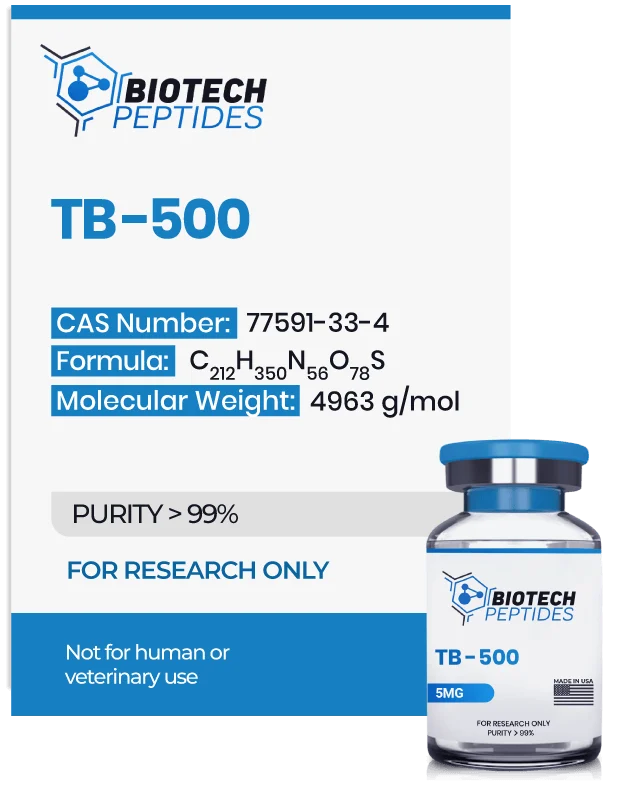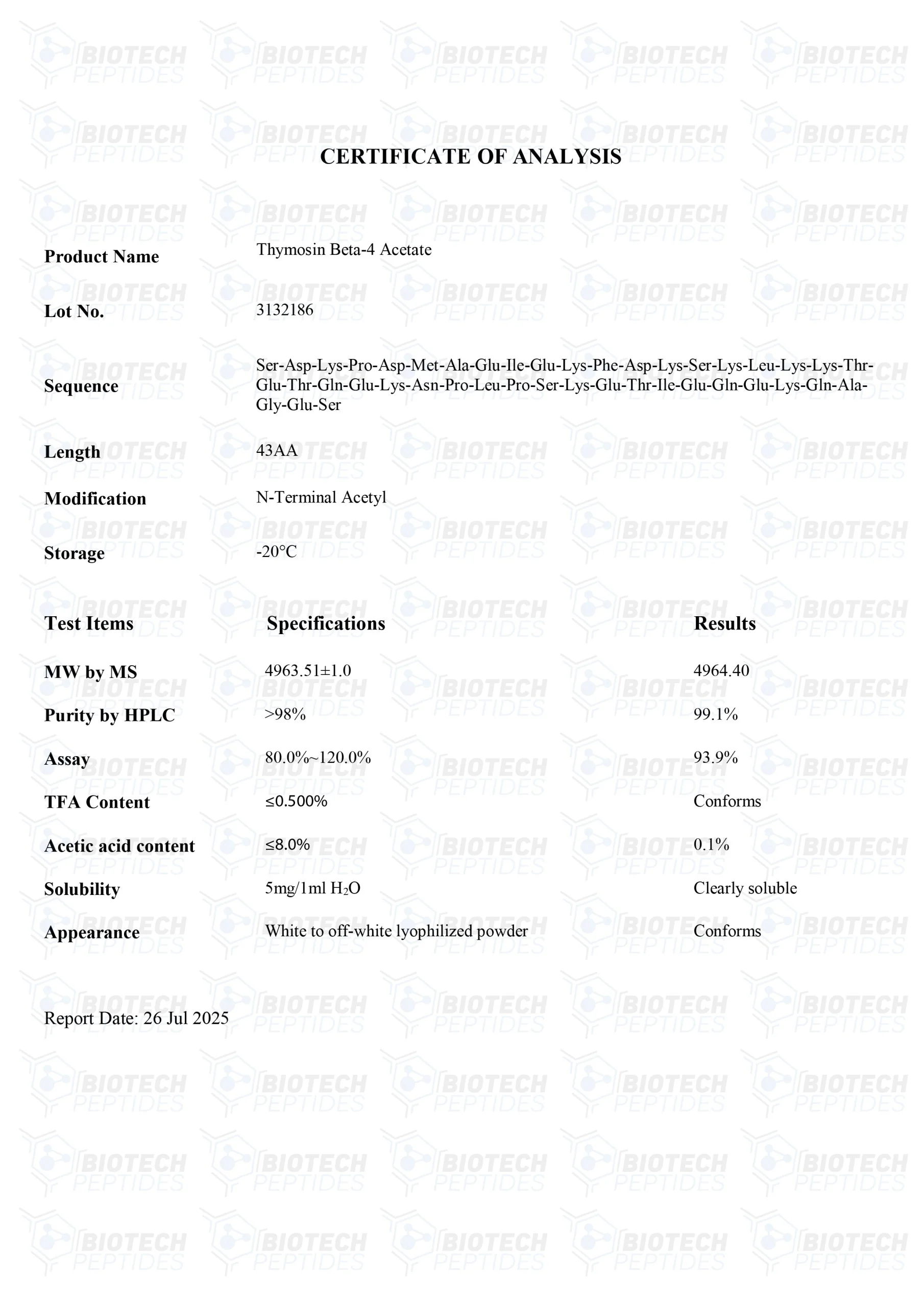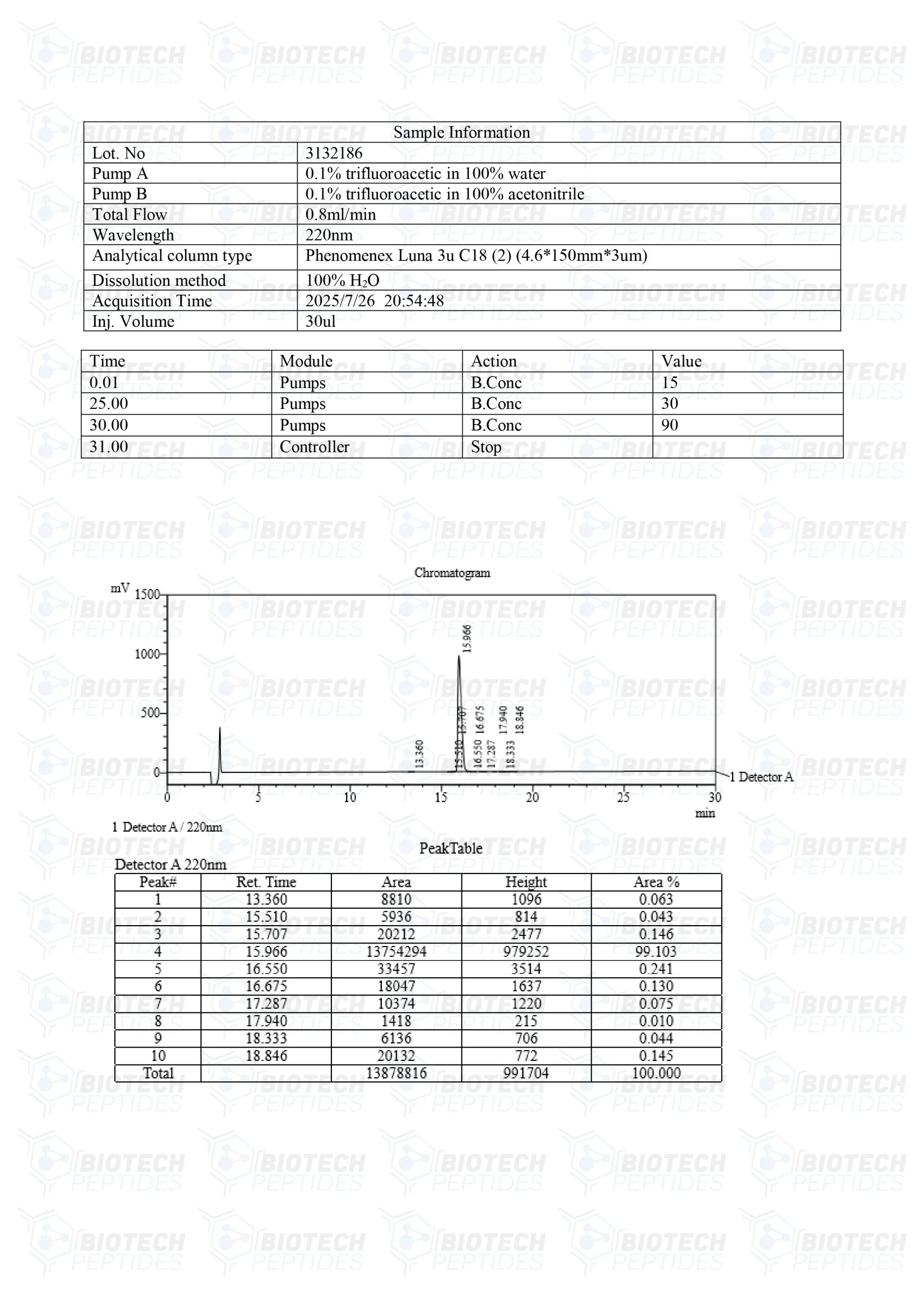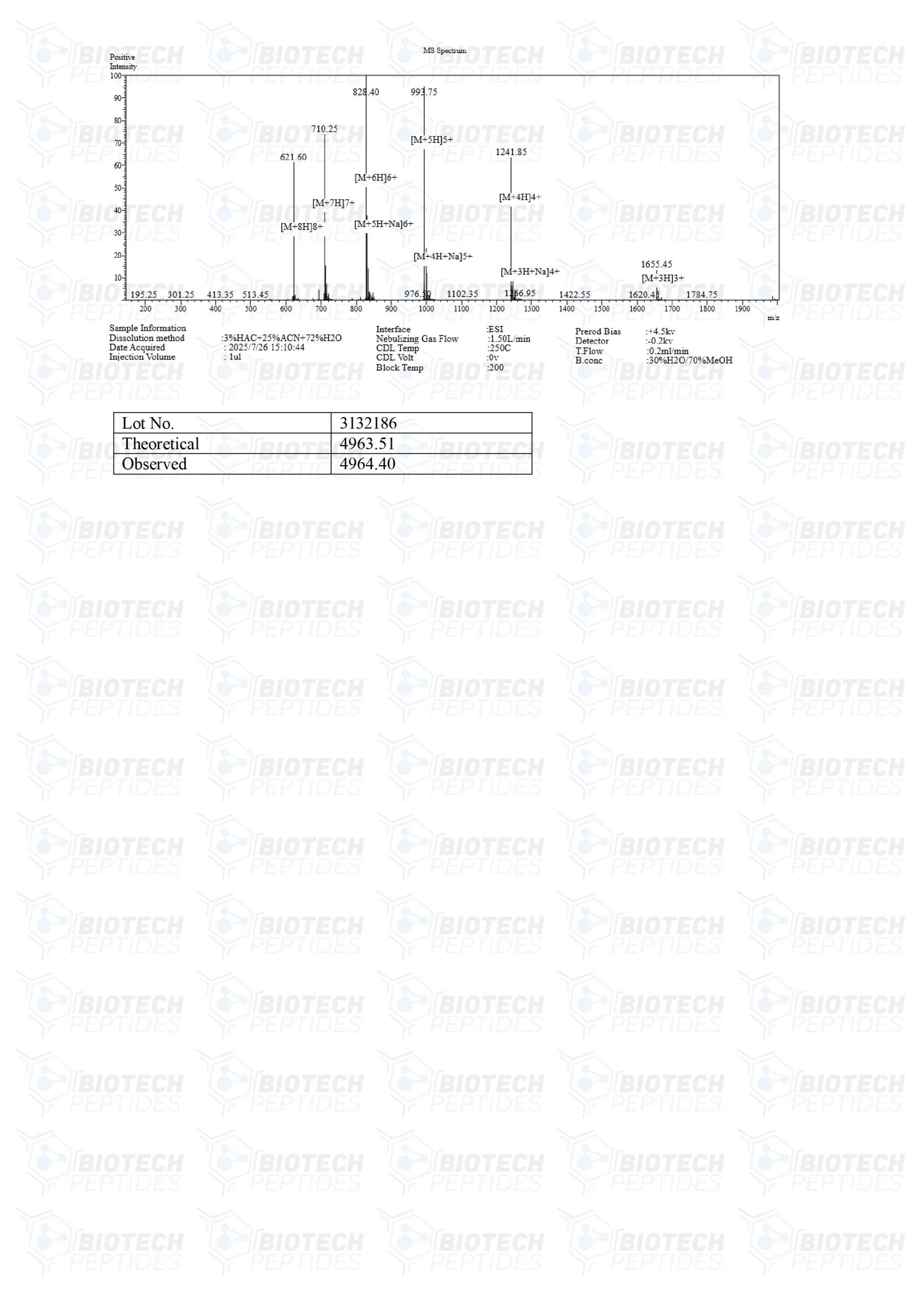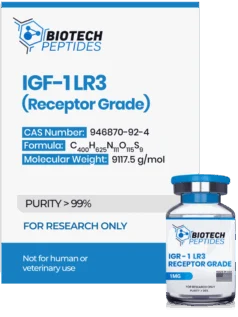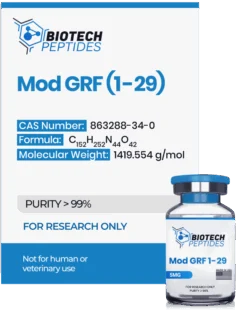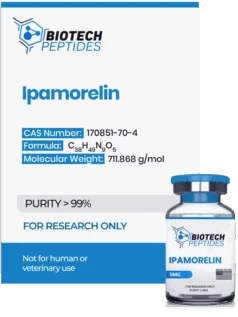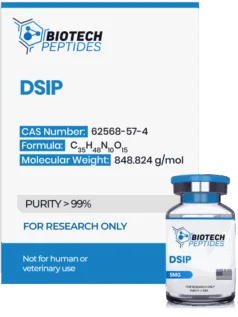TB-500 (Thymosin Beta-4) (5mg)
$72.00
TB-500 (Thymosin Beta-4) peptides are Synthesized and Lyophilized in the USA.
Discount per Quantity
| Quantity | 5 - 9 | 10 + |
|---|---|---|
| Discount | 5% | 10% |
| Price | $68.40 | $64.80 |
FREE - USPS priority shipping
TB-500 (Thymosin Beta-4) Peptide
TB-500, or Thymosin Beta-4, is a synthetic analog of the endogenous Thymosin beta 4 protein, which is considered ubiquitously present in cells. The peptide belongs to a widespread family of 16 related molecules considered to exhibit a high degree of sequence conservation and localization in the majority of tissues and circulating cells.
Thymosin Beta-4 is speculated to encompass a unique peptide sequence, LKKTETQ, found between the 16th and 24th amino acids. This sequence is thought to assist in actin binding potentially. Actins are proteins believed to be vital to the cell's cytoskeleton. They appear to maintain the cell's structural framework and are considered by experts to be crucial for primary cellular activities, such as movement.
It is hypothesized that Thymosin Beta-4 associates with actin by attaching to globular actin (G-actin), the monomeric form of actin, before it forms filamentous actin (F-actin). This suggested interaction between Thymosin Beta-4 and G-actin might impede the polymerization process, a mechanism known as actin sequestration. This interference might potentially increase the concentration of G-actin.
The assumed inhibition of F-actin polymerization by Thymosin Beta-4 might result in alterations to the cellular cytoskeleton's structure. These changes may impact the cell's ability to move and undergo shape transformations.[1] TB-500 was developed with the intention of sequestering and blocking actin polymerization in eukaryotic cells and influencing cell motility and transformation in experimental settings.
Specifications
Other Known Titles: Thymosin Beta-4
Molecular Formula: C212H350N56O78S
Molecular Weight: 4963 g/mol
Sequence: Ac-Ser-Asp-Lys-Pro-Asp-Met-Ala-Glu-lle-GluLys-Phe-Asp-Lys-Ser-Lys-Leu-Lys-LysThr-Glu-Thr-Gin-Glu-Lys-Asn-Pro-Leu-Pro-Ser-Lys-GluThy-lleGlu-Gin-Glu-Lys-Gin-Ala-Gly-Glu-Ser
TB-500 (Thymosin Beta-4) Research
TB-500 and Angiogenesis
TB-500, or Thymosin Beta-4 expression, has been observed by researchers to increase four to sixfold during early angiogenesis. Research suggests it may promote the growth of new blood cells from existing vessels, thereby potentially mediating faster tissue repair.[2] Researchers point out that “Delineating the molecular pathways impacted by Tβ4 to promote vascular growth and remodeling may reveal novel targets for … of vascular disease” research. The actin-binding domain happens to be a short central stretch of amino acid. It appears to be involved in TB-500-mediated regulation of blood cell division, tissue repair processes, migration of endothelial cells and keratinocytes, and possibly also higher production of extracellular matrix-degrading enzymes. Moreover, preliminary studies suggest that TB-500 might have extracellular actions in addition to its intracellular interactions with actin, potentially influencing various cellular activities.
These potential actions may involve cell movement and the formation of new blood vessels, known as angiogenesis.[3,4] It is proposed that Thymosin beta-4, the natural counterpart of TB-500, may promote these processes by affecting ATP synthase enzymes. These enzymes, located on the cell surfaces, are believed to be crucial for producing the energy necessary for cell functions. This theory implies a possible dual role for Thymosin beta-4 in maintaining cellular structure and contributing to energy production.
TB-500 and Anti-Inflammatory Potential
TB-500 research suggests the peptide’s potential anti-inflammatory characteristics.[5] According to the research, “It acts by increasing angiogenesis and cell migration and is currently [studied in] wound repair.” TB-500, unlike other naturally produced growth factors, may support endothelial and keratinocyte migration. It also does not appear to bind to the extracellular matrix, and researchers suggest that its low molecular weight may help it travel comparatively long distances through tissues. Study findings typically hypothesize the action of the peptide may be to regulate the polymerization and function of actin.
Recent research suggests that TB-500 may have the potential to elevate levels of microRNA-146a (miR-146a), which might serve as an inhibitory regulator within certain cellular communication pathways. These pathways appear to be closely linked to inflammatory processes and involve cytokines such as interleukin-1 receptor-associated kinase 1 (IRAK1) and tumor necrosis factor receptor-associated factor 6 (TRAF6). In a recent investigation, researchers hypothesized that this might be one mechanism by which TB-500 operates. They observed that inhibiting miR-146a might prevent the suppression of IRAK1 and TRAF6 by thymosin beta-4 (Tβ4), indicating a possible anti-inflammatory action. This raises the potential for TB-500 to influence inflammation-related cellular signaling through the modulation of miR-146a, IRAK1, and TRAF6 interactions.[6]
TB-500 and Muscle Cell Survival
Preliminary investigations imply that TB-500 may potentially aid in the repair of heart cells in experimental settings. There is some evidence suggesting that cardiac fibroblasts, which are connective tissue cells within the heart, might transform cells resembling cardiomyocytes, the muscle cells believed to be responsible for heart contractions.[7] Additionally, in vitro research has postulated that TB-500, when used alongside cardiac reprogramming methods, might work together to mitigate heart cell damage and support recovery. This may occur through the activation of endogenous cells within the heart area.
Further investigative studies in murine models involving coronary artery ligation (a surgical procedure that blocks these arteries) have suggested that TB-500 might increase the levels of integrin-linked kinase (ILK) and protein kinase B (Akt).[8] Both ILK and Akt are enzymes thought to be vital in cellular signaling pathways and might play essential roles in the early survival and repair of cardiomyocytes. This, in turn, may potentially improve the regeneration process of cardiac tissue.
TB-500 and Injury Recovery
Experts hypothesize that TB-500 might have the potential to influence cytokine production, which might theoretically enhance injury recovery processes.[9] Observations researchers have made following testing imply that TB-500 might increase the expression of interleukin-1β (IL-1β) and interleukin-6 (IL-6) mRNA in the corneal tissues of injured murine models. Specifically, after an alkali-induced injury, it is hypothesized that exposure to TB-500 may potentially reduce the levels of chemoattractants such as macrophage inflammatory protein-2 (MIP-2) and keratinocyte chemoattractant (KC). This reduction might result in decreased infiltration of polymorphonuclear neutrophils (PMNs), which are white blood cells essential for the inflammatory response.
Additionally, researchers speculate that TB-500 may interact with the nuclear factor kappa-light-chain-enhancer of activated B cells (NFκB) signaling pathways in the cornea. This may hint at anti-inflammatory potential. Furthermore, TB-500 is believed to possess anti-apoptotic properties, which may prevent programmed cell death. In cellular models, overexpression of TB-500 appears to correlate with increased cell proliferation, reduced basal levels of apoptosis, and enhanced resistance to apoptosis-inducing agents.
It is proposed that TB-500 might inhibit apoptosis in corneal epithelial cells by blocking the activity of caspases, which are enzymes that play a vital role in cell death. They might also prevent the release of the pro-apoptotic protein bcl-2 from mitochondria. The suggested anti-apoptotic mechanism may involve the reduction of early cell death signals and the possible activation of the survival kinase Akt. This activation may potentially occur through interactions with proteins such as the interesting, newly discovered cysteine-histidine-rich protein (PINCH) and integrin-linked kinase. These proteins are thought to be involved in cell survival signaling pathways. If these mechanisms are validated, they may collectively contribute to the enhanced recovery observed in various tissue injury models exposed to TB-500.
Disclaimer: The products mentioned are not intended for human or animal consumption. Research chemicals are intended solely for laboratory experimentation and/or in-vitro testing. Bodily introduction of any sort is strictly prohibited by law. All purchases are limited to licensed researchers and/or qualified professionals. All information shared in this article is for educational purposes only.
References
- Gurtner GC, Werner S, Barrandon Y, Longaker MT. Wound repair and regeneration. Nature. 2008 May 15;453(7193):314-21. doi: 10.1038/nature07039. PMID: 18480812.
- Dubé, K. N., & Smart, N. (2018). Thymosin β4 and the vasculature: multiple roles in development, repair, and protection against disease. Expert opinion on biological therapy, 18(sup1), 131–139. doi:10.1080/14712598.2018.1459558
- Huff, T., Müller, C. S., Otto, A. M., Netzker, R., & Hannappel, E. (2001). Beta-thymosins are small acidic peptides with multiple functions. The international journal of biochemistry & cell biology, 33(3), 205–220. https://doi.org/10.1016/s1357-2725(00)00087-x
- Freeman, K. W., Bowman, B. R., & Zetter, B. R. (2011). Regenerative protein thymosin beta-4 is a novel regulator of purinergic signaling. FASEB journal: official publication of the Federation of American Societies for Experimental Biology, 25(3), 907–915. https://doi.org/10.1096/fj.10-169417
- Philp, D., Goldstein, A. L., & Kleinman, H. K. (2004). Thymosin beta4 promotes angiogenesis, wound healing, and hair follicle development. Mechanisms of aging and development, 125(2), 113–115. doi:10.1016/j.mad.2003.11.005
- Santra, M., Zhang, Z. G., Yang, J., Santra, S., Santra, S., Chopp, M., & Morris, D. C. (2014). Thymosin β4 up-regulation of microRNA-146a promotes oligodendrocyte differentiation and suppression of the Toll-like proinflammatory pathway. The Journal of Biological Chemistry, 289(28), 19508–19518. https://doi.org/10.1074/jbc.M113.529966
- Srivastava, D., Ieda, M., Fu, J., & Qian, L. (2012). Cardiac repair with thymosin β4 and cardiac reprogramming factors. Annals of the New York Academy of Sciences, 1270, 66–72. https://doi.org/10.1111/j.1749-6632.2012.06696.x
- Bock-Marquette, I., Saxena, A., White, M. D., Dimaio, J. M., & Srivastava, D. (2004). Thymosin beta4 activates integrin-linked kinase and promotes cardiac cell migration, survival, and cardiac repair. Nature, 432(7016), 466–472. https://doi.org/10.1038/nature03000
- Sosne, G., Qiu, P., & Kurpakus-Wheater, M. (2007). Thymosin beta 4: A novel corneal wound healing and anti-inflammatory agent. Clinical ophthalmology (Auckland, N.Z.), 1(3), 201–207.

